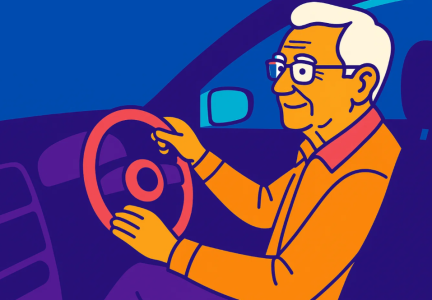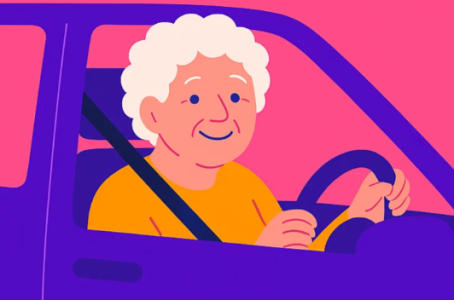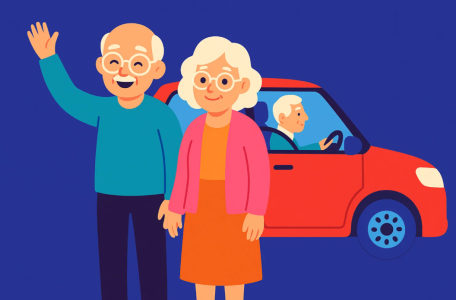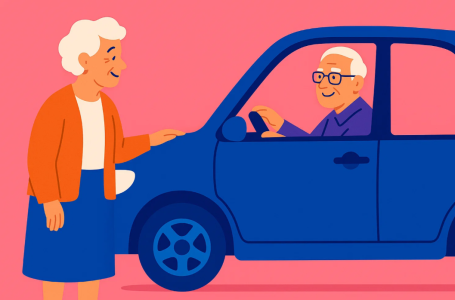Buckle up, seniors! New driving regulations could target elderly licence holders
Have you ever wondered if there might come a day when you have to retake a driving test just because of your age? It’s a question many of senior Victorians are asking lately. And for good reason: a recent tragedy has sparked a big conversation about older drivers – how to keep everyone safe while still treating seniors fairly.
The Victorian government is now taking a close look at the rules for older drivers, and there’s a lot to unpack. Let’s delve into what’s happening and what it might mean for senior Australians who’ve spent decades behind the wheel.
A few weeks ago in Melbourne’s eastern suburbs, a 91-year-old driver lost control of her car and crashed near a playground. It was a horrific incident: a 59-year-old woman and a 60-year-old man – reportedly a pair of grandparents out with their little grandson – were struck and tragically killed, and a two-year-old boy was injured.
This heartbreaking accident has been front-page news and has naturally got people talking. From local coffee shop chats to the halls of Parliament, everyone is asking: are we doing enough to ensure our older drivers are safe on the road?
The public outcry following the crash put pressure on authorities to respond. Melissa Horne, Victoria’s Roads Minister, quickly announced that her department would review the current licensing rules for senior drivers. “Every lever that we can pull to save people’s lives is so important,” she told a TV interviewer, capturing the urgency felt across the community after the accident.
Acting Premier Ben Carroll echoed that sentiment, calling it a “valid question” to ask whether older motorists should face more checks or tests. He vowed to work with Minister Horne on exploring possible reforms. In short, the Victorian government has acknowledged that this issue needs attention – and soon.
It’s worth noting that this isn’t coming out of nowhere. Concerns about older drivers’ safety have been raised before, but often quietly. Unfortunately, it often takes a tragedy to bring an issue into sharp focus. That’s exactly what’s happened here. The Wantirna South crash (as it’s become known) was a wake-up call, and now the state is taking a hard look at whether our current approach for older drivers is up to scratch.
Before we talk about what might change, let’s explain what the rules are right now for older drivers in Victoria. In truth, Victoria has one of the more relaxed systems in Australia when it comes to seniors on the road. There’s no mandatory age when you have to re-sit a driving test or get a medical clearance just because you’ve had a birthday. In fact, aside from more frequent licence renewals, older Victorian drivers don’t face many extra hoops at all.
Here’s how it works: once you turn 75 in Victoria, your licence needs to be renewed every three years (instead of the ten-year renewals younger drivers get). This is just a paperwork thing – you fill out the renewal, pay the fee, and off you go. There’s no automatic driving test or doctor’s certificate required at 75 or at any age beyond.
As VicRoads (the state’s roads and licensing authority) plainly states, getting older doesn’t mean you have to stop driving. There’s no set age at which you’re forced off the road. Retaining your licence is all about your health and your driving behaviour, not your birth date. If you’re medically fit and driving safely, you can keep on driving indefinitely.
Source: 7NEWS Australia / YouTube
Now, this doesn’t mean there are no checks and balances at all. Victoria’s system relies a lot on personal responsibility and case-by-case intervention. For example, if you develop a medical condition that could affect your ability to drive (say worsening eyesight, epilepsy, or the early stages of dementia), you are legally obligated to inform VicRoads.
At that point, VicRoads might ask you to get a report from your doctor about whether it’s safe for you to drive. In some cases, they might require you to undergo a driving assessment with a professional or an occupational therapist. The same goes if a concern is raised about your driving – perhaps by a police officer, a doctor, or even a family member – VicRoads can request that you have a medical review or a practical driving test to make sure everything’s alright.
But the key point is there’s no blanket rule that says “at 80 (or 90) you must do X.” It’s very much up to the individual and their circumstances. Victoria has essentially said, “we’ll trust our senior drivers (and their doctors) to know when they’re no longer safe to drive.”
In practice, many older drivers here self-regulate their driving as they age – and VicRoads actively encourages this. For instance, a lot of people cut back on night driving if glare and poor vision at night become an issue. Others avoid heavy traffic or long trips if they start feeling less confident. There are VicRoads publications and fact sheets (like “Am I Still Fit to Drive?”) that guide older drivers in assessing their own driving and suggest adjustments. The philosophy has been to help seniors keep driving safely for as long as they can, rather than impose a strict age cut-off.
This approach treats driving as a personal responsibility. Every time we get behind the wheel, regardless of age, we have to honestly ask ourselves, “Am I fit to drive today?” For older drivers, that might include considering recent health changes or medications. Victoria’s current system places a lot of trust in seniors to make that call, with the understanding that if something is wrong, they (or those around them) will act – by getting medical advice, restricting driving, or in some cases voluntarily surrendering a licence.
Many Victorians in their 80s and 90s do choose to hang up the keys on their own when they feel the time is right, without any government mandate.
So, how does Victoria’s hands-off approach compare to what other states do? In short, most other Australian states have stricter requirements once you reach a certain age. Victoria has been more of an outlier in its lack of compulsory testing. Let’s look at two big examples, New South Wales and Queensland, since they often come up in this discussion.
New South Wales (NSW)
If you’re an older driver up north in NSW, the rules get tougher as you age. From 75 years old, NSW drivers must undergo a yearly medical assessment to keep their licence. Basically, each year you need your GP to sign off that you’re fit to drive. Then, when you turn 85, NSW adds a practical driving test into the mix. Every two years from 85 onward, you have to either pass an on-road driving test or you can choose to switch to a modified licence with restrictions. (The modified licence is an option NSW offers if you don’t want to do the test – it lets you continue driving but typically limits you to a certain radius from home, and often only in daylight hours or other such conditions.)
NSW is actually the only state that mandates a driving test based purely on age for regular car licences. Those tests can be nerve-wracking, as you might imagine, and thousands of older NSW drivers opt for the modified licence to skip the ordeal of testing.
Queensland
In Queensland, there’s no mandatory on-road test for seniors like in NSW, but from age 75 you must always carry a current Medical Certificate for Driving. This means every year once you’re 75+, you visit the doctor, they evaluate your health and ability to drive, and they issue a certificate (basically a doctor’s note) that you then carry with you when you drive.
If you don’t have that certificate on you (and up to date), your licence isn’t valid. The focus here is on making sure any health issues are caught on a yearly basis. There’s no specific driving test involved unless a doctor or authority thinks one is necessary for an individual.
What about other places? Most other states and territories have something in place along these lines. The ACT and Tasmania are similar to NSW and Qld in that they require annual medical checks for older drivers (starting at 75).
Western Australia kicks in a bit later – there, you need a yearly medical from age 80 onward. South Australia takes a slightly different tack by using self-assessment for older drivers: each year after a certain age, SA drivers have to fill out a form themselves, declaring any medical conditions and whether they feel fit to drive (and if there are concerns, a medical exam can be required).
In contrast, Victoria has had no automatic tests or doctor’s notes at any age. They just shorten the licence renewal period. That’s it. So, with the Victorian review on the table now, people are looking at these other states and asking: Should we do the same here?
For instance, should Victoria start requiring a yearly GP check-up for drivers over 75, like so much of the country does? Should we consider a driving test at some age milestone, like NSW’s rule at 85? Or perhaps adopt something like SA’s self-assessment model? These are the kinds of questions likely to come up in the review.
Source: 7NEWS Australia / YouTube
It’s interesting to note that each system has its supporters and critics. Some argue NSW’s approach is too harsh – after all, even a perfectly capable 85-year-old might struggle with test anxiety or unfamiliar testing routes, and that doesn’t necessarily mean they’re unsafe in their normal, day-to-day driving.
On the other hand, proponents say NSW’s strict approach saves lives by ensuring those behind the wheel at 85+ really should be there. Queensland’s medical certificate system is seen as a middle ground: it ensures a doctor checks on you annually, but it doesn’t put you through a driving test unless needed. Many Victorian seniors I’ve spoken with have said, “If it comes to it, I’d rather just have a chat with my GP each year than go do a driving test.” So there are different ways to tackle the issue, and part of Victoria’s task now is figuring out what might work best for our state.
Whenever the topic of older drivers comes up, there’s a delicate balance to strike between safety and fairness/independence. On one hand, we all want our roads to be safe. No one – no matter their age – should be behind the wheel if they pose a danger to themselves or others.
On the other hand, driving is tightly linked to independence, especially for older Australians, and no one wants to be unfairly stripped of that freedom just because of a number on a birth certificate. Let’s talk about both sides of this coin.
First, the safety concerns: It’s an unfortunate reality that as we get older, our bodies and senses change. Our reaction times can slow down, vision and hearing might decline, and certain health conditions (like heart problems or cognitive impairments) become more common. These changes can affect driving – there’s no denying that.
Road safety experts often point out that drivers over a certain age have a higher risk of serious injury or death if they are in a crash. This isn’t necessarily because older drivers crash more often (in fact, per kilometre driven, seniors don’t have the highest crash rates – younger drivers do), but if, say, a 20-year-old and an 80-year-old are in the same kind of accident, the 80-year-old is more likely to be badly hurt. We naturally become more fragile with age. So there is a genuine concern and compassionate interest in protecting older drivers from harm, as much as protecting others.
Additionally, conditions like dementia or early Alzheimer’s raise tough questions. If an older person begins to suffer cognitive decline, it might not be obvious to them or their family until something scary happens on the road. Same with eyesight – maybe you haven’t noticed how much your night vision has worsened until you’re blinded by oncoming headlights one evening. Regular check-ups (be it medical exams or even on-road tests) can catch declines in ability that the driver themselves might not fully recognise. This is a key argument for having some age-based assessments: it’s a proactive safety net.
Now, flip to the other side: independence and fairness. For many seniors, driving isn’t just a mundane task – it’s a lifeline. Think about where you live and how you get around. In a big city like Melbourne, older folks might have access to trams, buses, or trains (though even then, carrying groceries on a tram or climbing bus steps can be challenging).
In rural and regional areas, a car is often the only practical way to get around. Being told “you can’t drive anymore” can feel like a crushing blow – it can limit your social life, make it harder to see family and friends, and turn simple errands into major challenges. There’s a huge emotional component to giving up driving; it represents a loss of independence and sometimes even a loss of identity. Many of us have been driving since we were teenagers – it’s a skill and freedom we’ve had for, say, 60+ years. Letting that go is not easy.
Because of this, there’s understandable resistance to any rules that seem to single out older drivers just for being old. Ageism is a real thing that people feel. I’ve heard fellow seniors say, “I haven’t had an accident in decades, I follow the road rules diligently, but once I turn 85 I’m treated like a ticking time bomb behind the wheel. How is that fair?”
In NSW, some seniors have been quite vocal, with one 87-year-old publicly calling the mandatory driving test at 85 “ageist”. Her view (and she’s not alone) is that the requirement is only based on age, not on any track record of poor driving, and that feels discriminatory.
Let’s talk about stereotypes too. Society isn’t always kind to older drivers in its jokes and comments. We’ve all heard quips about the “little old lady” driving slowly or the assumption that an older man who caused a fender-bender must have hit the wrong pedal. These stereotypes can hurt. The truth is, older drivers are often very safe drivers in terms of habits: they wear seatbelts, they don’t speed as much, they rarely drive drunk, and they usually aren’t doing silly things like street racing or texting while driving.
VicRoads itself notes that compared to younger age groups, seniors tend to be more cautious and responsible on the road. Many have decades of experience to draw on – they’ve seen all kinds of situations and generally don’t take unnecessary risks.
However, even the most responsible driver can be caught out by physical limitations. This is why advocates for seniors say: evaluate the individual, not just the age. If someone in their late 80s is driving just fine – good reflexes, good judgement, and perhaps they’ve wisely adapted by not driving in challenging conditions – then why force them through onerous tests?
On the flip side, if a driver in their 60s (well below any “senior” threshold) is showing signs of dangerous driving or cognitive decline, that should be addressed too. The focus should be on ability, not age. That’s a key message from groups like Council on the Ageing and other senior advocacy organizations. They urge that any new approach should avoid stigmatizing all older drivers as a problem, and instead find ways to identify those few who truly aren’t safe behind the wheel due to health issues or other factors.
It’s also worth noting that many older drivers self-adjust their driving habits long before any formal rule comes into play. It’s pretty common for people in their 70s, 80s, and beyond to make conscious choices like, “I don’t drive at night anymore, my eyes can’t handle the glare,” or “I’ll only drive in my local area where I’m comfortable,” or “I avoid the freeway because the high speeds and heavy traffic stress me out.” These are all sensible adaptations. They show an awareness of one’s limits. In a way, this is an informal version of the “restricted licence” concept – except it’s self-imposed. So one could argue, seniors are already doing a lot of what a mandated system would ask them to do: being careful and adjusting to stay safe.
Another aspect of fairness is how any changes might be implemented. One worry seniors have is abrupt or onerous processes. For instance, imagine if Victoria suddenly said “starting next year, everyone over 80 must pass a driving test.” That would cause a lot of anxiety and, frankly, practical chaos (think of the logistics of testing tens of thousands of people!). Realistically, any changes would likely be phased in and handled with plenty of notice and support – but it’s a fear people have. No one wants to feel like the rug could be pulled out from under them.
Lastly, let’s consider the bigger picture of road safety. While this discussion focuses on older drivers, some seniors point out (quite rightly) that young drivers cause a disproportionate number of accidents and fatalities. Shouldn’t we be putting equal scrutiny on them? In fact, we do in some ways – new drivers have graduated licensing systems, P-plate restrictions, etc. But the point is, risk on the road isn’t solely a function of being 80 or 90. It’s about many factors (age being just one). A comprehensive approach to road safety looks at all high-risk groups and situations: youth, motorcyclists, heavy vehicle drivers, distracted drivers, and yes, also the very old and the very young.
The bottom line in this debate seems to be balance. We want everyone to be safe on the roads, and we also want seniors to feel respected and valued, not marginalised. Any solution has to thread that needle.
Source: 9News Perth / YouTube
With the review now underway, what can we expect going forward? The government hasn’t made any decisions yet – the review is about gathering evidence and opinions. Minister Melissa Horne has been clear that nothing will be done rashly. In fact, she’s said that any changes will involve “wide consultation” and that “this conversation must include the whole community. It’s about safety, but it’s also about fairness.” So, it sounds like they plan to talk to a lot of stakeholders: road safety experts, senior citizens’ groups, health professionals (like GPs who would be doing those medical assessments), perhaps even families of both older drivers and victims of accidents, to get a rounded view.
One likely outcome is that Victoria might move closer to what other states do. Introducing mandatory medical check-ups for older drivers seems a plausible step. That would mean at a certain age (75 is the common number elsewhere), you’d need a doctor to sign off periodically. This could be a gentle first step because many seniors are regularly seeing their GP anyway – it would just formalize that process to include a “fitness to drive” discussion each year or two.
Will Victoria also introduce a driving test for seniors at some age? It’s hard to say. That idea is more controversial. We know NSW’s example: a lot of NSW drivers switch to a restricted licence at 85 to avoid the test, which suggests many really don’t like it. Victoria might decide that a test is too confrontational or not the most effective way to go.
Alternatively, they might consider optional on-road assessments or refresher courses. For instance, RACV (Royal Automobile Club of Victoria) already offers a program where older drivers can take a lesson or assessment specifically aimed at seniors. There’s no pass or fail – it’s more about feedback and coaching to improve any weak spots. The review could look at encouraging more of these voluntary programs, possibly even subsidising them, as a way to boost safety without the scare factor of a high-stakes test.
Another idea floated by some experts is a self-assessment or education program. For example, maybe when you hit a certain age, VicRoads could require you to fill out a self-assessment checklist each year (much like SA’s approach) and perhaps attend an information session or watch a safety video about aging and driving. These kinds of measures raise awareness and prompt self-reflection, rather than immediately revoking anyone’s licence.
We also might see more emphasis on transitional steps, like conditional or restricted licences. Right now in Victoria it’s mostly all-or-nothing (you either have a full licence or you don’t drive). But there’s no rule that says it has to be that way. They could introduce, for instance, a “daytime only” condition for those who have trouble with night vision, or a radius restriction (only driving within, say, 10km of home) for those who aren’t comfortable venturing far but can handle local streets.
These kinds of tailored restrictions could extend the time an older person can keep driving safely, by keeping them out of the situations that are most risky for them. It’s similar to how learner and probationary drivers have certain conditions – we could craft sensible conditions for older drivers who need them. This approach can be seen as a compromise: it’s not a full licence loss, but it’s not pretending everything is fine either. It matches the driving privileges to the driver’s capability.
Beyond the licensing rules themselves, the review will likely consider support systems. If we ask seniors to accept new rules, we should think about how to make it easier for those who might eventually lose some driving privileges. This could mean improving public transport accessibility for seniors (low-floor buses, better community transport in suburbs and regional towns, etc.), expanding services like senior shuttle buses or council-driven transport services for shopping and appointments, and even things like ride-share training (teaching older folks how to use Uber or taxi apps comfortably).
When older drivers do stop driving – whether voluntarily or not – their world can shrink dramatically. So part of “fairness” is ensuring they aren’t left isolated. It’s a broader policy issue, really: mobility as we age.
Also, family conversations will be a big part of the picture. Often it’s the adult children of an elderly driver who first notice warning signs (a minor scrape on the car, or stories of getting lost on familiar roads). Helping families navigate those tough conversations – maybe through resources or counselling – could be another angle the review touches on. It’s not explicitly a licensing matter, but it’s related.
After all, in an ideal world, an unsafe older driver would stop driving due to caring advice from loved ones or their doctor, rather than because the law stepped in.
As this review unfolds, one term you’ll hear is “national consistency.” Some experts (like those at the Australasian College of Road Safety) are suggesting that it might be time for Australia to adopt a more uniform policy on older driver licensing.
Right now, the rules vary from state to state, which can be confusing – especially if you move interstate or even just drive across borders on a road trip. The argument for a consistent approach is that it would ensure all older drivers in Australia meet at least a baseline of fitness requirements, and it would be easier for everyone to understand. The challenge, of course, is agreeing on what that approach should be (annual medicals? Tests at 85? Something else?).
But the fact that Victoria is reviewing its stance means the country’s last hold-out on mandatory checks is reconsidering – and that opens the door to perhaps aligning more with others or even setting a new national standard if Victoria comes up with a particularly good model.
In all of this, it’s reassuring to know that the intention isn’t to target seniors unfairly. Officials like Minister Horne and Premier Carroll have been careful to show respect in their comments – they talk about balancing safety with individual mobility. That phrase “individual mobility” is essentially code for “your ability to get around, i.e., your independence.” They recognise it’s a balance.
They’ve also stressed that the community (including older people) will get to have their say. So if you’re a senior driver reading this and you have strong opinions or ideas, it will be worth keeping an eye out for forums, surveys, or consultation sessions as part of this review. Having your voice heard is important – after all, who knows the issue better than those living it?
At the end of the day, everyone – young or old – shares the same road. We want to trust each other out there. Just as young drivers have to prove themselves through a graduated system, older drivers might soon have to demonstrate their fitness in new ways. It can feel like an inconvenience or even an insult to some, but the goal is a worthy one: saving lives and preventing tragedy. And that includes the lives of older drivers themselves, who we want to keep safe as much as anyone else.
Change, if it comes, will likely be gradual and measured. There’s no need to panic that all seniors will suddenly be forced to hand in their licences overnight. The conversation now is about planning ahead – “steering the future,” if you will – to make sure Victoria’s approach is up to the task as our population ages.
So, let’s keep talking about it openly and honestly, without scare campaigns or denial. It’s a chance to improve things in a considerate way. In the spirit of that open conversation, I’ll leave you with a question to ponder (and perhaps discuss with your own family and friends): Have you had to adjust how or when you drive as you’ve gotten older?
READ MORE: Just What the Doctor Ordered? Labor’s $25 PBS Script Cap Aims to Soothe Hip Pockets
The Victorian government is now taking a close look at the rules for older drivers, and there’s a lot to unpack. Let’s delve into what’s happening and what it might mean for senior Australians who’ve spent decades behind the wheel.
Why Talk About Older Drivers Now?
A few weeks ago in Melbourne’s eastern suburbs, a 91-year-old driver lost control of her car and crashed near a playground. It was a horrific incident: a 59-year-old woman and a 60-year-old man – reportedly a pair of grandparents out with their little grandson – were struck and tragically killed, and a two-year-old boy was injured.
This heartbreaking accident has been front-page news and has naturally got people talking. From local coffee shop chats to the halls of Parliament, everyone is asking: are we doing enough to ensure our older drivers are safe on the road?
The public outcry following the crash put pressure on authorities to respond. Melissa Horne, Victoria’s Roads Minister, quickly announced that her department would review the current licensing rules for senior drivers. “Every lever that we can pull to save people’s lives is so important,” she told a TV interviewer, capturing the urgency felt across the community after the accident.
Acting Premier Ben Carroll echoed that sentiment, calling it a “valid question” to ask whether older motorists should face more checks or tests. He vowed to work with Minister Horne on exploring possible reforms. In short, the Victorian government has acknowledged that this issue needs attention – and soon.
It’s worth noting that this isn’t coming out of nowhere. Concerns about older drivers’ safety have been raised before, but often quietly. Unfortunately, it often takes a tragedy to bring an issue into sharp focus. That’s exactly what’s happened here. The Wantirna South crash (as it’s become known) was a wake-up call, and now the state is taking a hard look at whether our current approach for older drivers is up to scratch.
How Licence Rules Work in Victoria Today
Before we talk about what might change, let’s explain what the rules are right now for older drivers in Victoria. In truth, Victoria has one of the more relaxed systems in Australia when it comes to seniors on the road. There’s no mandatory age when you have to re-sit a driving test or get a medical clearance just because you’ve had a birthday. In fact, aside from more frequent licence renewals, older Victorian drivers don’t face many extra hoops at all.
Here’s how it works: once you turn 75 in Victoria, your licence needs to be renewed every three years (instead of the ten-year renewals younger drivers get). This is just a paperwork thing – you fill out the renewal, pay the fee, and off you go. There’s no automatic driving test or doctor’s certificate required at 75 or at any age beyond.
As VicRoads (the state’s roads and licensing authority) plainly states, getting older doesn’t mean you have to stop driving. There’s no set age at which you’re forced off the road. Retaining your licence is all about your health and your driving behaviour, not your birth date. If you’re medically fit and driving safely, you can keep on driving indefinitely.
Source: 7NEWS Australia / YouTube
Now, this doesn’t mean there are no checks and balances at all. Victoria’s system relies a lot on personal responsibility and case-by-case intervention. For example, if you develop a medical condition that could affect your ability to drive (say worsening eyesight, epilepsy, or the early stages of dementia), you are legally obligated to inform VicRoads.
At that point, VicRoads might ask you to get a report from your doctor about whether it’s safe for you to drive. In some cases, they might require you to undergo a driving assessment with a professional or an occupational therapist. The same goes if a concern is raised about your driving – perhaps by a police officer, a doctor, or even a family member – VicRoads can request that you have a medical review or a practical driving test to make sure everything’s alright.
But the key point is there’s no blanket rule that says “at 80 (or 90) you must do X.” It’s very much up to the individual and their circumstances. Victoria has essentially said, “we’ll trust our senior drivers (and their doctors) to know when they’re no longer safe to drive.”
In practice, many older drivers here self-regulate their driving as they age – and VicRoads actively encourages this. For instance, a lot of people cut back on night driving if glare and poor vision at night become an issue. Others avoid heavy traffic or long trips if they start feeling less confident. There are VicRoads publications and fact sheets (like “Am I Still Fit to Drive?”) that guide older drivers in assessing their own driving and suggest adjustments. The philosophy has been to help seniors keep driving safely for as long as they can, rather than impose a strict age cut-off.
This approach treats driving as a personal responsibility. Every time we get behind the wheel, regardless of age, we have to honestly ask ourselves, “Am I fit to drive today?” For older drivers, that might include considering recent health changes or medications. Victoria’s current system places a lot of trust in seniors to make that call, with the understanding that if something is wrong, they (or those around them) will act – by getting medical advice, restricting driving, or in some cases voluntarily surrendering a licence.
Many Victorians in their 80s and 90s do choose to hang up the keys on their own when they feel the time is right, without any government mandate.
Taking a Page from NSW and Queensland
So, how does Victoria’s hands-off approach compare to what other states do? In short, most other Australian states have stricter requirements once you reach a certain age. Victoria has been more of an outlier in its lack of compulsory testing. Let’s look at two big examples, New South Wales and Queensland, since they often come up in this discussion.
New South Wales (NSW)
If you’re an older driver up north in NSW, the rules get tougher as you age. From 75 years old, NSW drivers must undergo a yearly medical assessment to keep their licence. Basically, each year you need your GP to sign off that you’re fit to drive. Then, when you turn 85, NSW adds a practical driving test into the mix. Every two years from 85 onward, you have to either pass an on-road driving test or you can choose to switch to a modified licence with restrictions. (The modified licence is an option NSW offers if you don’t want to do the test – it lets you continue driving but typically limits you to a certain radius from home, and often only in daylight hours or other such conditions.)
NSW is actually the only state that mandates a driving test based purely on age for regular car licences. Those tests can be nerve-wracking, as you might imagine, and thousands of older NSW drivers opt for the modified licence to skip the ordeal of testing.
Queensland
In Queensland, there’s no mandatory on-road test for seniors like in NSW, but from age 75 you must always carry a current Medical Certificate for Driving. This means every year once you’re 75+, you visit the doctor, they evaluate your health and ability to drive, and they issue a certificate (basically a doctor’s note) that you then carry with you when you drive.
If you don’t have that certificate on you (and up to date), your licence isn’t valid. The focus here is on making sure any health issues are caught on a yearly basis. There’s no specific driving test involved unless a doctor or authority thinks one is necessary for an individual.
What about other places? Most other states and territories have something in place along these lines. The ACT and Tasmania are similar to NSW and Qld in that they require annual medical checks for older drivers (starting at 75).
Western Australia kicks in a bit later – there, you need a yearly medical from age 80 onward. South Australia takes a slightly different tack by using self-assessment for older drivers: each year after a certain age, SA drivers have to fill out a form themselves, declaring any medical conditions and whether they feel fit to drive (and if there are concerns, a medical exam can be required).
In contrast, Victoria has had no automatic tests or doctor’s notes at any age. They just shorten the licence renewal period. That’s it. So, with the Victorian review on the table now, people are looking at these other states and asking: Should we do the same here?
For instance, should Victoria start requiring a yearly GP check-up for drivers over 75, like so much of the country does? Should we consider a driving test at some age milestone, like NSW’s rule at 85? Or perhaps adopt something like SA’s self-assessment model? These are the kinds of questions likely to come up in the review.
Source: 7NEWS Australia / YouTube
It’s interesting to note that each system has its supporters and critics. Some argue NSW’s approach is too harsh – after all, even a perfectly capable 85-year-old might struggle with test anxiety or unfamiliar testing routes, and that doesn’t necessarily mean they’re unsafe in their normal, day-to-day driving.
On the other hand, proponents say NSW’s strict approach saves lives by ensuring those behind the wheel at 85+ really should be there. Queensland’s medical certificate system is seen as a middle ground: it ensures a doctor checks on you annually, but it doesn’t put you through a driving test unless needed. Many Victorian seniors I’ve spoken with have said, “If it comes to it, I’d rather just have a chat with my GP each year than go do a driving test.” So there are different ways to tackle the issue, and part of Victoria’s task now is figuring out what might work best for our state.
Safety First – But Let’s Be Fair
Whenever the topic of older drivers comes up, there’s a delicate balance to strike between safety and fairness/independence. On one hand, we all want our roads to be safe. No one – no matter their age – should be behind the wheel if they pose a danger to themselves or others.
On the other hand, driving is tightly linked to independence, especially for older Australians, and no one wants to be unfairly stripped of that freedom just because of a number on a birth certificate. Let’s talk about both sides of this coin.
First, the safety concerns: It’s an unfortunate reality that as we get older, our bodies and senses change. Our reaction times can slow down, vision and hearing might decline, and certain health conditions (like heart problems or cognitive impairments) become more common. These changes can affect driving – there’s no denying that.
Road safety experts often point out that drivers over a certain age have a higher risk of serious injury or death if they are in a crash. This isn’t necessarily because older drivers crash more often (in fact, per kilometre driven, seniors don’t have the highest crash rates – younger drivers do), but if, say, a 20-year-old and an 80-year-old are in the same kind of accident, the 80-year-old is more likely to be badly hurt. We naturally become more fragile with age. So there is a genuine concern and compassionate interest in protecting older drivers from harm, as much as protecting others.
Additionally, conditions like dementia or early Alzheimer’s raise tough questions. If an older person begins to suffer cognitive decline, it might not be obvious to them or their family until something scary happens on the road. Same with eyesight – maybe you haven’t noticed how much your night vision has worsened until you’re blinded by oncoming headlights one evening. Regular check-ups (be it medical exams or even on-road tests) can catch declines in ability that the driver themselves might not fully recognise. This is a key argument for having some age-based assessments: it’s a proactive safety net.
Now, flip to the other side: independence and fairness. For many seniors, driving isn’t just a mundane task – it’s a lifeline. Think about where you live and how you get around. In a big city like Melbourne, older folks might have access to trams, buses, or trains (though even then, carrying groceries on a tram or climbing bus steps can be challenging).
In rural and regional areas, a car is often the only practical way to get around. Being told “you can’t drive anymore” can feel like a crushing blow – it can limit your social life, make it harder to see family and friends, and turn simple errands into major challenges. There’s a huge emotional component to giving up driving; it represents a loss of independence and sometimes even a loss of identity. Many of us have been driving since we were teenagers – it’s a skill and freedom we’ve had for, say, 60+ years. Letting that go is not easy.
Because of this, there’s understandable resistance to any rules that seem to single out older drivers just for being old. Ageism is a real thing that people feel. I’ve heard fellow seniors say, “I haven’t had an accident in decades, I follow the road rules diligently, but once I turn 85 I’m treated like a ticking time bomb behind the wheel. How is that fair?”
In NSW, some seniors have been quite vocal, with one 87-year-old publicly calling the mandatory driving test at 85 “ageist”. Her view (and she’s not alone) is that the requirement is only based on age, not on any track record of poor driving, and that feels discriminatory.
Let’s talk about stereotypes too. Society isn’t always kind to older drivers in its jokes and comments. We’ve all heard quips about the “little old lady” driving slowly or the assumption that an older man who caused a fender-bender must have hit the wrong pedal. These stereotypes can hurt. The truth is, older drivers are often very safe drivers in terms of habits: they wear seatbelts, they don’t speed as much, they rarely drive drunk, and they usually aren’t doing silly things like street racing or texting while driving.
VicRoads itself notes that compared to younger age groups, seniors tend to be more cautious and responsible on the road. Many have decades of experience to draw on – they’ve seen all kinds of situations and generally don’t take unnecessary risks.
However, even the most responsible driver can be caught out by physical limitations. This is why advocates for seniors say: evaluate the individual, not just the age. If someone in their late 80s is driving just fine – good reflexes, good judgement, and perhaps they’ve wisely adapted by not driving in challenging conditions – then why force them through onerous tests?
On the flip side, if a driver in their 60s (well below any “senior” threshold) is showing signs of dangerous driving or cognitive decline, that should be addressed too. The focus should be on ability, not age. That’s a key message from groups like Council on the Ageing and other senior advocacy organizations. They urge that any new approach should avoid stigmatizing all older drivers as a problem, and instead find ways to identify those few who truly aren’t safe behind the wheel due to health issues or other factors.
It’s also worth noting that many older drivers self-adjust their driving habits long before any formal rule comes into play. It’s pretty common for people in their 70s, 80s, and beyond to make conscious choices like, “I don’t drive at night anymore, my eyes can’t handle the glare,” or “I’ll only drive in my local area where I’m comfortable,” or “I avoid the freeway because the high speeds and heavy traffic stress me out.” These are all sensible adaptations. They show an awareness of one’s limits. In a way, this is an informal version of the “restricted licence” concept – except it’s self-imposed. So one could argue, seniors are already doing a lot of what a mandated system would ask them to do: being careful and adjusting to stay safe.
Another aspect of fairness is how any changes might be implemented. One worry seniors have is abrupt or onerous processes. For instance, imagine if Victoria suddenly said “starting next year, everyone over 80 must pass a driving test.” That would cause a lot of anxiety and, frankly, practical chaos (think of the logistics of testing tens of thousands of people!). Realistically, any changes would likely be phased in and handled with plenty of notice and support – but it’s a fear people have. No one wants to feel like the rug could be pulled out from under them.
Lastly, let’s consider the bigger picture of road safety. While this discussion focuses on older drivers, some seniors point out (quite rightly) that young drivers cause a disproportionate number of accidents and fatalities. Shouldn’t we be putting equal scrutiny on them? In fact, we do in some ways – new drivers have graduated licensing systems, P-plate restrictions, etc. But the point is, risk on the road isn’t solely a function of being 80 or 90. It’s about many factors (age being just one). A comprehensive approach to road safety looks at all high-risk groups and situations: youth, motorcyclists, heavy vehicle drivers, distracted drivers, and yes, also the very old and the very young.
The bottom line in this debate seems to be balance. We want everyone to be safe on the roads, and we also want seniors to feel respected and valued, not marginalised. Any solution has to thread that needle.
Source: 9News Perth / YouTube
The Road Ahead
With the review now underway, what can we expect going forward? The government hasn’t made any decisions yet – the review is about gathering evidence and opinions. Minister Melissa Horne has been clear that nothing will be done rashly. In fact, she’s said that any changes will involve “wide consultation” and that “this conversation must include the whole community. It’s about safety, but it’s also about fairness.” So, it sounds like they plan to talk to a lot of stakeholders: road safety experts, senior citizens’ groups, health professionals (like GPs who would be doing those medical assessments), perhaps even families of both older drivers and victims of accidents, to get a rounded view.
One likely outcome is that Victoria might move closer to what other states do. Introducing mandatory medical check-ups for older drivers seems a plausible step. That would mean at a certain age (75 is the common number elsewhere), you’d need a doctor to sign off periodically. This could be a gentle first step because many seniors are regularly seeing their GP anyway – it would just formalize that process to include a “fitness to drive” discussion each year or two.
Will Victoria also introduce a driving test for seniors at some age? It’s hard to say. That idea is more controversial. We know NSW’s example: a lot of NSW drivers switch to a restricted licence at 85 to avoid the test, which suggests many really don’t like it. Victoria might decide that a test is too confrontational or not the most effective way to go.
Alternatively, they might consider optional on-road assessments or refresher courses. For instance, RACV (Royal Automobile Club of Victoria) already offers a program where older drivers can take a lesson or assessment specifically aimed at seniors. There’s no pass or fail – it’s more about feedback and coaching to improve any weak spots. The review could look at encouraging more of these voluntary programs, possibly even subsidising them, as a way to boost safety without the scare factor of a high-stakes test.
Another idea floated by some experts is a self-assessment or education program. For example, maybe when you hit a certain age, VicRoads could require you to fill out a self-assessment checklist each year (much like SA’s approach) and perhaps attend an information session or watch a safety video about aging and driving. These kinds of measures raise awareness and prompt self-reflection, rather than immediately revoking anyone’s licence.
We also might see more emphasis on transitional steps, like conditional or restricted licences. Right now in Victoria it’s mostly all-or-nothing (you either have a full licence or you don’t drive). But there’s no rule that says it has to be that way. They could introduce, for instance, a “daytime only” condition for those who have trouble with night vision, or a radius restriction (only driving within, say, 10km of home) for those who aren’t comfortable venturing far but can handle local streets.
These kinds of tailored restrictions could extend the time an older person can keep driving safely, by keeping them out of the situations that are most risky for them. It’s similar to how learner and probationary drivers have certain conditions – we could craft sensible conditions for older drivers who need them. This approach can be seen as a compromise: it’s not a full licence loss, but it’s not pretending everything is fine either. It matches the driving privileges to the driver’s capability.
Beyond the licensing rules themselves, the review will likely consider support systems. If we ask seniors to accept new rules, we should think about how to make it easier for those who might eventually lose some driving privileges. This could mean improving public transport accessibility for seniors (low-floor buses, better community transport in suburbs and regional towns, etc.), expanding services like senior shuttle buses or council-driven transport services for shopping and appointments, and even things like ride-share training (teaching older folks how to use Uber or taxi apps comfortably).
When older drivers do stop driving – whether voluntarily or not – their world can shrink dramatically. So part of “fairness” is ensuring they aren’t left isolated. It’s a broader policy issue, really: mobility as we age.
Also, family conversations will be a big part of the picture. Often it’s the adult children of an elderly driver who first notice warning signs (a minor scrape on the car, or stories of getting lost on familiar roads). Helping families navigate those tough conversations – maybe through resources or counselling – could be another angle the review touches on. It’s not explicitly a licensing matter, but it’s related.
After all, in an ideal world, an unsafe older driver would stop driving due to caring advice from loved ones or their doctor, rather than because the law stepped in.
As this review unfolds, one term you’ll hear is “national consistency.” Some experts (like those at the Australasian College of Road Safety) are suggesting that it might be time for Australia to adopt a more uniform policy on older driver licensing.
Right now, the rules vary from state to state, which can be confusing – especially if you move interstate or even just drive across borders on a road trip. The argument for a consistent approach is that it would ensure all older drivers in Australia meet at least a baseline of fitness requirements, and it would be easier for everyone to understand. The challenge, of course, is agreeing on what that approach should be (annual medicals? Tests at 85? Something else?).
But the fact that Victoria is reviewing its stance means the country’s last hold-out on mandatory checks is reconsidering – and that opens the door to perhaps aligning more with others or even setting a new national standard if Victoria comes up with a particularly good model.
In all of this, it’s reassuring to know that the intention isn’t to target seniors unfairly. Officials like Minister Horne and Premier Carroll have been careful to show respect in their comments – they talk about balancing safety with individual mobility. That phrase “individual mobility” is essentially code for “your ability to get around, i.e., your independence.” They recognise it’s a balance.
They’ve also stressed that the community (including older people) will get to have their say. So if you’re a senior driver reading this and you have strong opinions or ideas, it will be worth keeping an eye out for forums, surveys, or consultation sessions as part of this review. Having your voice heard is important – after all, who knows the issue better than those living it?
At the end of the day, everyone – young or old – shares the same road. We want to trust each other out there. Just as young drivers have to prove themselves through a graduated system, older drivers might soon have to demonstrate their fitness in new ways. It can feel like an inconvenience or even an insult to some, but the goal is a worthy one: saving lives and preventing tragedy. And that includes the lives of older drivers themselves, who we want to keep safe as much as anyone else.
Change, if it comes, will likely be gradual and measured. There’s no need to panic that all seniors will suddenly be forced to hand in their licences overnight. The conversation now is about planning ahead – “steering the future,” if you will – to make sure Victoria’s approach is up to the task as our population ages.
So, let’s keep talking about it openly and honestly, without scare campaigns or denial. It’s a chance to improve things in a considerate way. In the spirit of that open conversation, I’ll leave you with a question to ponder (and perhaps discuss with your own family and friends): Have you had to adjust how or when you drive as you’ve gotten older?
READ MORE: Just What the Doctor Ordered? Labor’s $25 PBS Script Cap Aims to Soothe Hip Pockets
Last edited:












